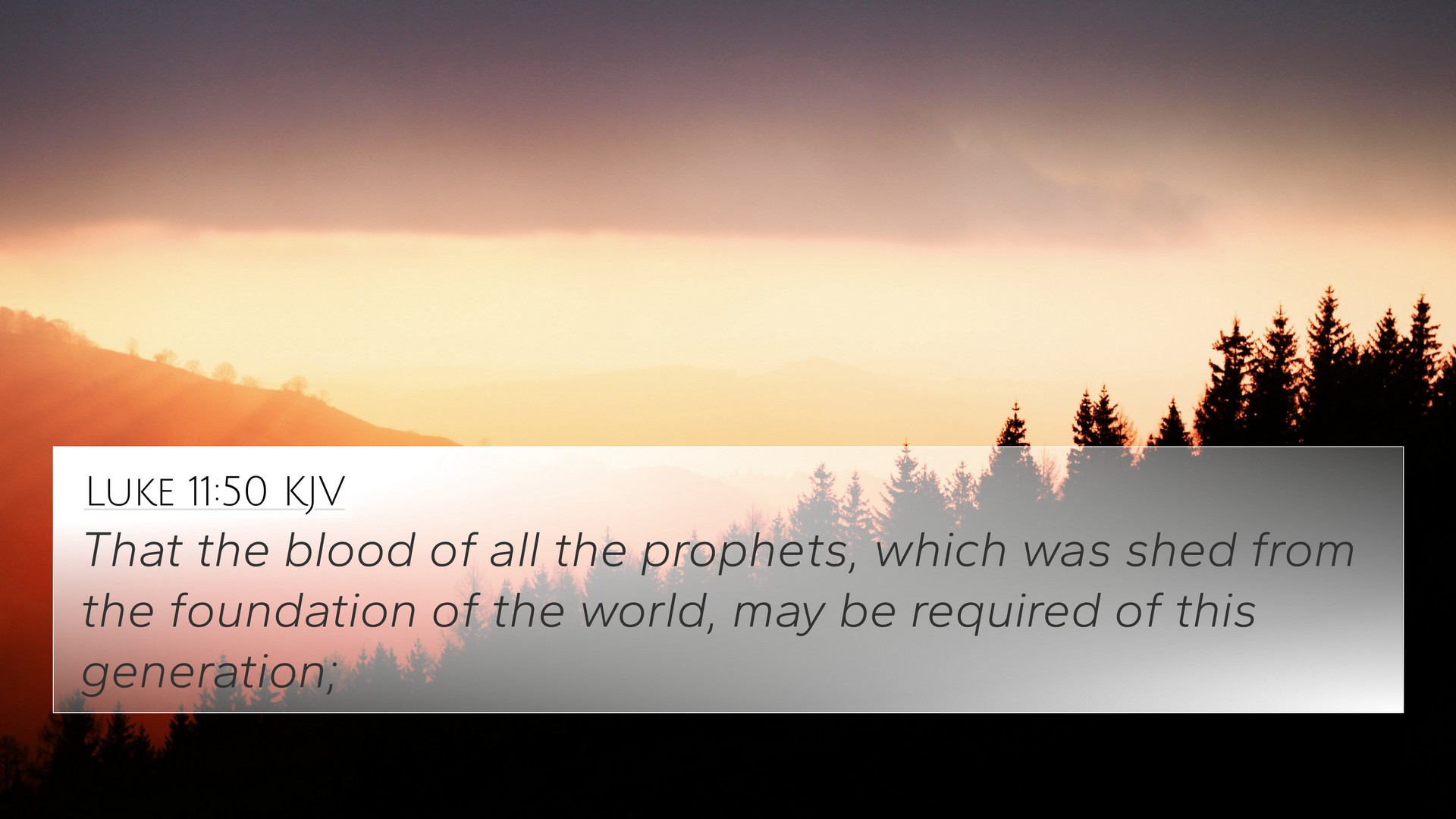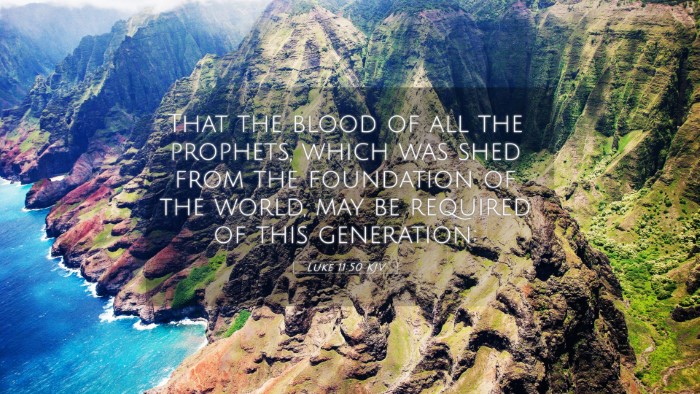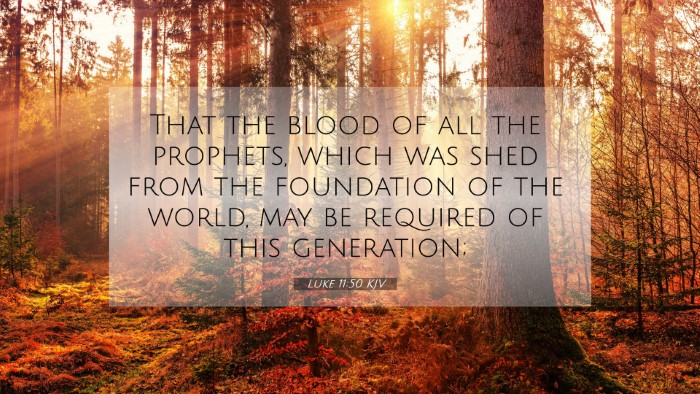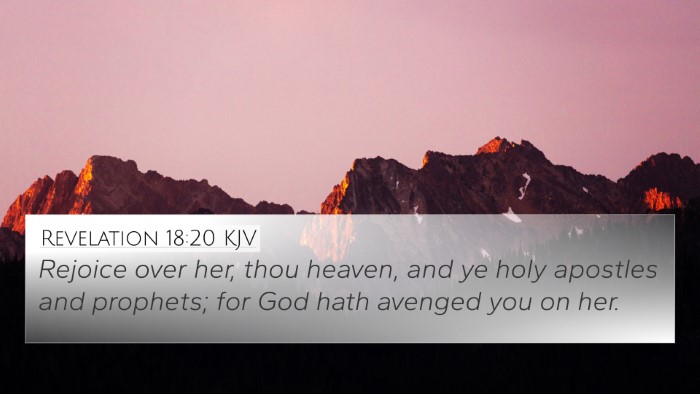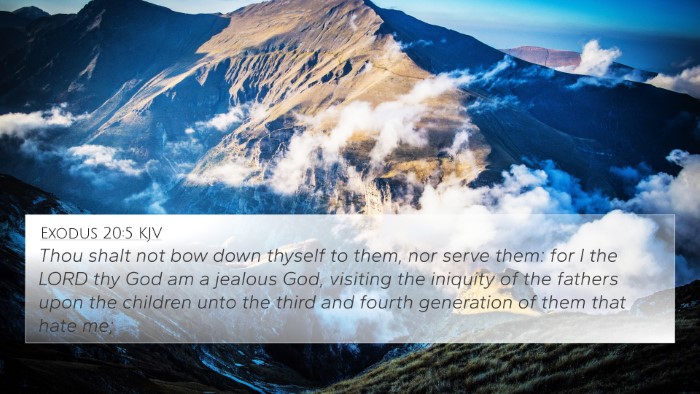Understanding Luke 11:50
Luke 11:50 states: "That the blood of all the prophets, which was shed from the foundation of the world, may be required of this generation." This verse conveys a profound message about accountability, judgment, and the historical rejection of God’s messengers. Various public domain commentaries delve into its meaning, offering a rich exploration of its implications.
Verse Context and Meaning
In the context of Jesus’ statements, this verse is part of a broader discussion about the hypocrisy of the religious leaders and the culpability of the current generation of Jews in rejecting the prophets sent by God. It underscores the weight of responsibility that falls on those who hear the message but choose to ignore or rebel against it.
Insights from Commentaries
- Matthew Henry: Henry emphasizes the historical aspect of this verse, pointing out that the "blood of all the prophets" symbolizes not only the lives of those slain for their faithfulness but also the spiritual response of the people of God across generations. Thus, this generation is not just guilty for their actions but also for failing to learn from the past.
- Albert Barnes: Barnes highlights the legal implications of this verse, noting that "requiring" the blood signifies divine justice. He suggests that each generation is accountable for its response to divine revelation. Barnes stresses that just like past generations, the responsibility now rests upon those in current times who reject God's word.
- Adam Clarke: Clarke interprets the verse with a focus on the implications for the Jewish leaders of Jesus’ time. He asserts that their rejection represents a culmination of a long-standing trend where God's prophets faced persecution and death for their messages of repentance. Clarke underscores the necessity of acknowledging the sins of the past.
Bible Verse Cross-References
This verse can be cross-referenced with several ones that resonate with its message of prophetic rejection and the weight of responsibility. Here are some significant connections:
- Matthew 23:35 - "That upon you may come all the righteous blood shed upon the earth..." - This verse reinforces the concept of accountability for the murder of prophets.
- Hebrews 11:36-38 - "And others had trial of cruel mockings and scourgings..." - This passage details the persecutions of the prophets and how true faith often leads to suffering.
- Acts 7:52 - "Which of the prophets have not your fathers persecuted?" - Stephen directly addresses the Jewish leaders, invoking their history of violence against God’s messengers.
- 1 Thessalonians 2:15 - "Who both killed the Lord Jesus, and their own prophets, and have persecuted us..." - Paul reiterates the continuity of the rejection of God’s message.
- Luke 13:34 - "O Jerusalem, thou that killest the prophets..." - Jesus expresses sorrow over Jerusalem’s history of violence towards those sent by God.
- Jeremiah 26:23 - "And they fetched Uriah out of Egypt, and brought him unto Jehoiakim; who slew him with the sword..." - A historical reference to how the prophets were often silenced.
- Zechariah 1:4 - "Be ye not as your fathers, unto whom the former prophets have cried..." - A call to learn from the failures of past generations.
Thematic Connections and Analysis
The themes encapsulated in Luke 11:50 are wide-reaching. They can prompt a comparative Bible verse analysis across different books and testaments. The historical continuity of prophetic rejection highlights an essential aspect of both the Old and New Testament.
Connections Between Bible Verses
Understanding the connections between Bible verses can illuminate the profundity of scripture. This practice not only enriches our comprehension but deepens our engagement with themes of judgment and mercy.
Utilizing Cross-Referencing Tools
In Bible study, utilizing tools such as bible concordances or a bible cross-reference guide can facilitate deeper understanding of these connections. By engaging in techniques such as cross-referencing Bible study methods, we can unravel the intricate web of scriptural themes.
Conclusion
Luke 11:50 serves as a stark reminder of the consequences of rejecting prophetic voices throughout biblical history. Understanding its implications through various commentaries allows believers to grasp the depth of spiritual accountability that extends beyond their immediate context. As we consider the connections between this and other scripture, we engage in a richer, more nuanced dialogue with the text and its divine truths.
